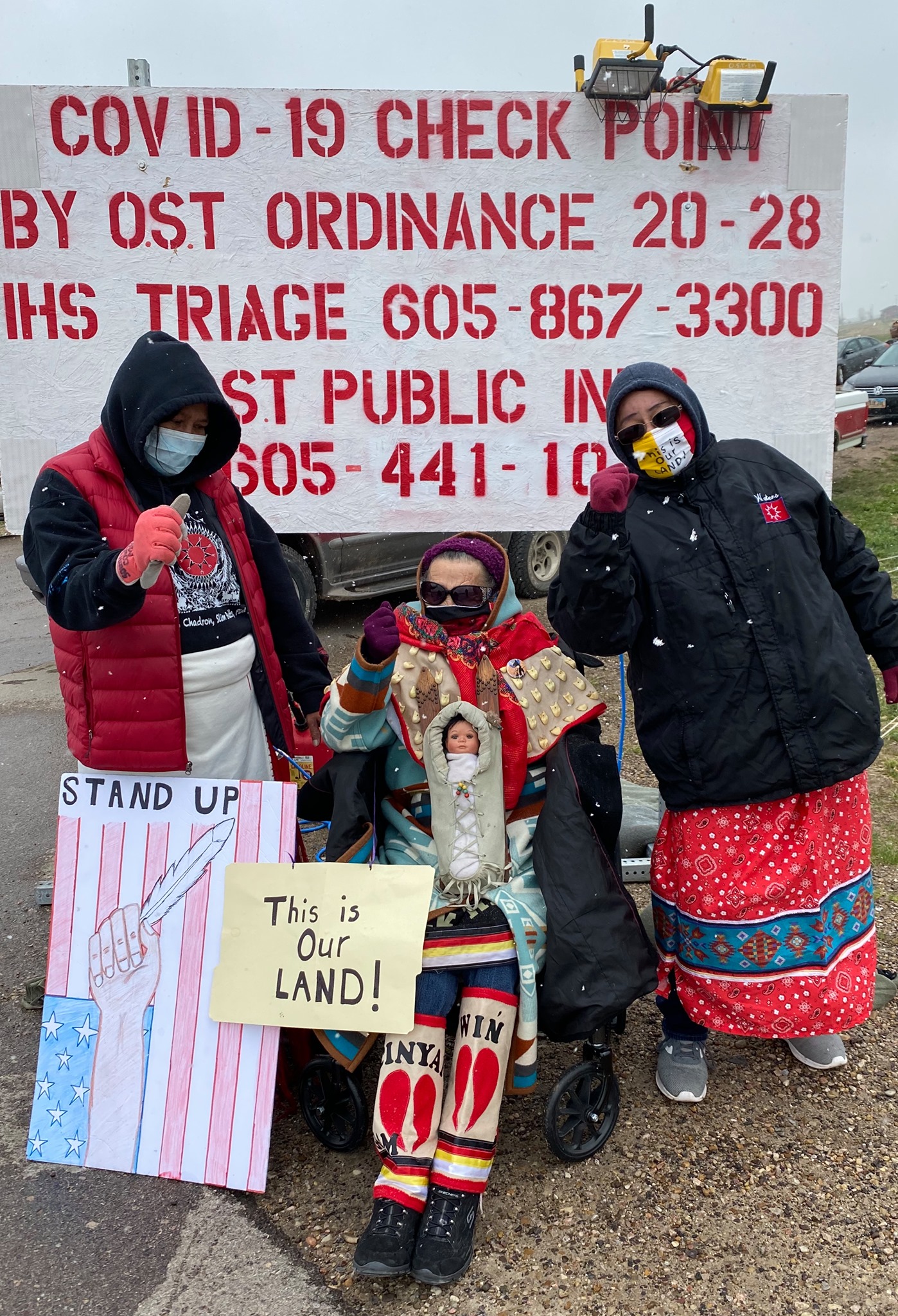
A coronavirus checkpoint on the Pine Ridge Reservation. Photo courtesy Anna Halverson
PRESS RELEASE: May 11, 2020
THE SEVEN COUNCIL FIRES STAND UNITED
Agency Village, South Dakota — The Oceti Sakowin of the Dakota/Nakota/Lakota Oyate or Seven Council Fires of the Great Sioux Nation stand united to protect our Native people from the ravages of the Coronavirus COVID-19. Sisseton Wahpeton Oyate represents two of the traditional Seven Council Fires, and we have conferred with our sister Dakota/Nakota/Lakota Nation Tribes and we stand united in supporting our inherent sovereignty and treaty rights to protect our Native people.
Our Sisseton Wahpeton Oyate and the Spirit Lake Tribe entered the 1867 Sioux Nation treaty preserving our traditional lands at the Lake Traverse Reserve and Spirit Lake Tribe. The 1868 Sioux Nation Treaty set aside the Great Sioux Reservation as the “permanent home” of our Sioux Nation tribes, including the Cheyenne River and Oglala Sioux, our traditional Itancan—leaders—reserved our rights to self-determination and self-government.
Perhaps the most essential power of sovereignty is self-defense, protection the lives of our Native Peoples. The Federal Courts have consistently ruled that Indian nations have inherent sovereign authority over our “members” and our “territory,” and the Federal Courts have expressly ruled that our Indian nations retain jurisdiction over our highways:
in Rosebud Sioux Tribe v. South Dakota, 900 F.2d 1164 (8th Cir. 1990). Rosebud reversed the district court’s decision which had sustained the state’s exercise of jurisdiction over highways running through reservations in the state.
Accordingly, in South Dakota v. Spotted Horse, 462 N.W.2d 463 (1990) affirmed that the State has no jurisdiction over Indians—or tribal police officers—on tribal reservation roads.
In contrast, Tribal Police retain authority to stop, detain, search and transport or eject all alleged offenders—Indian or non-Indian—on reservation highways. For example, in United States v. Terry, (8th Cir. 2005), the Federal Court of Appeals explained:
The Supreme Court has recognized that tribal law enforcement authorities possess “traditional and undisputed power to exclude persons whom they deem to be undesirable from tribal lands,” and therefore have “the power to restrain those who disturb public order on the reservation, and if necessary to eject them.”
Reasonably, Tribal Governments have the power to protect the public health and safety on reservation roads. In Terry, our Federal Court of appeals ruled that tribal police have the authority to “detain non-Indians whose conduct disturbs the public order on their reservation,” and upheld the Oglala Sioux Tribe’s overnight detention of a non-Indian offender and the search of his pick-up under the so-called “automobile exception” to the 4th Amendment’s warrant requirements.
Some cite Federal road regulations concerning consultation and agreements, but those regulations allow for immediate action to protect public health. Here again, our Indian nations have authority to protect our own Native people from outside infection during the National COVID-19 Emergency declared by the President and affirmed by the Congress of the United States.
A number of South Dakota state legislators have written to the Governor, questioned the threats of litigation, explaining: “We do not wish to be party of another lawsuit that will ultimately cost the people of South Dakota more money. We wish to work with all parties involved for a reasonable, legal, and appropriate solution that address the concerns of all sovereigns involved.”
Sisseton Wahpeton Chairman Donovan White said, “All of our Seven Council Fires stand in unity with the Cheyenne River and Oglala Sioux Tribes. The Governor should work with her state legislators, work with the Tribal Chairmen and Councils, acknowledge the sovereign authority of the Cheyenne River and Oglala Sioux Tribes and come up with a reasonable plan to assist them in protecting public safety and health of our Native people in South Dakota with public announcements, etc. After all, our Native people are four times more likely to succumb to the COVID-19 Coronavirus.”
Indian Health Service Announces New Deputy Director for Quality Health Care and Enterprise Risk Management (Indian Health Service)
Federal Emergency Management Agency (FEMA)
White House Office of Management and Budget (Joe Biden Administration)
Tuba City Regional Health Care Corporation (Arizona, Navajo Nation)
Oklahoma City Indian Clinic (OKCIC)
Indian Health Service (Department of Health and Human Services)
Navajo Nation Town Hall (Arizona, New Mexico, Utah)
Navajo Nation (Arizona, New Mexico, Utah)
Tribal organizations statement on advance appropriations for Indian Health Service
Indian Health Service Statement on Advance Appropriations (Department of Health and Human Services)
Indian Health Service (Department of Health and Human Services)
Indian Health Service (Department of Health and Human Services)
Navajo Nation (Arizona, New Mexico, Utah)
Indian Health Service (Department of Health and Human Services)
